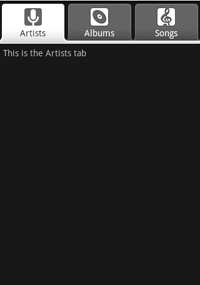ArtistsActivity, AlbumsActivity, and SongsActivity. These
will each represent a separate tab. For now, make each one display a simple message using a {@link
android.widget.TextView}. For example:
public class ArtistsActivity extends Activity {
public void onCreate(Bundle savedInstanceState) {
super.onCreate(savedInstanceState);
TextView textview = new TextView(this);
textview.setText("This is the Artists tab");
setContentView(textview);
}
}
Notice that this doesn't use a layout file. Just create a {@link
android.widget.TextView}, give it some text and set that as the content. Duplicate this for
each of the three activities, and add the corresponding <activity/> tags to the Android Manifest file.


For this tutorial, you can copy these images and use them for all three tabs. (When you create tabs in your own application, you should create customized tab icons.)
Now create a state-list drawable that specifies which image to use for each tab state:
- Save the icon images in your project
res/drawable/directory. - Create a new XML file in
res/drawable/namedic_tab_artists.xmland insert the following:<?xml version="1.0" encoding="utf-8"?> <selector xmlns:android="http://schemas.android.com/apk/res/android"> <!-- When selected, use grey --> <item android:drawable="@drawable/ic_tab_artists_grey" android:state_selected="true" /> <!-- When not selected, use white--> <item android:drawable="@drawable/ic_tab_artists_white" /> </selector>This is a state-list drawable, which you will apply as the tab image. When the tab state changes, the tab icon will automatically switch between the images defined here.
res/layout/main.xml file and insert the following:
<?xml version="1.0" encoding="utf-8"?>
<TabHost xmlns:android="http://schemas.android.com/apk/res/android"
android:id="@android:id/tabhost"
android:layout_width="fill_parent"
android:layout_height="fill_parent">
<LinearLayout
android:orientation="vertical"
android:layout_width="fill_parent"
android:layout_height="fill_parent"
android:padding="5dp">
<TabWidget
android:id="@android:id/tabs"
android:layout_width="fill_parent"
android:layout_height="wrap_content" />
<FrameLayout
android:id="@android:id/tabcontent"
android:layout_width="fill_parent"
android:layout_height="fill_parent"
android:padding="5dp" />
</LinearLayout>
</TabHost>
This is the layout that will display the tabs and provide navigation between each {@link android.app.Activity} created above.
The {@link android.widget.TabHost} requires that a {@link android.widget.TabWidget} and a {@link android.widget.FrameLayout} both live somewhere within it. To position the {@link android.widget.TabWidget} and {@link android.widget.FrameLayout} vertically, a {@link android.widget.LinearLayout} is used. The {@link android.widget.FrameLayout} is where the content for each tab goes, which is empty now because the {@link android.widget.TabHost} will automatically embed each {@link android.app.Activity} within it.
Notice that the {@link android.widget.TabWidget} and the {@link android.widget.FrameLayout} elements have the IDs {@code tabs} and {@code tabcontent}, respectively. These names must be used so that the {@link android.widget.TabHost} can retrieve references to each of them. It expects exactly these names.
HelloTabWidget.java and make it extend {@link
android.app.TabActivity}:
public class HelloTabWidget extends TabActivity {
public void onCreate(Bundle savedInstanceState) {
super.onCreate(savedInstanceState);
setContentView(R.layout.main);
Resources res = getResources(); // Resource object to get Drawables
TabHost tabHost = getTabHost(); // The activity TabHost
TabHost.TabSpec spec; // Resusable TabSpec for each tab
Intent intent; // Reusable Intent for each tab
// Create an Intent to launch an Activity for the tab (to be reused)
intent = new Intent().setClass(this, ArtistsActivity.class);
// Initialize a TabSpec for each tab and add it to the TabHost
spec = tabHost.newTabSpec("artists").setIndicator("Artists",
res.getDrawable(R.drawable.ic_tab_artists))
.setContent(intent);
tabHost.addTab(spec);
// Do the same for the other tabs
intent = new Intent().setClass(this, AlbumsActivity.class);
spec = tabHost.newTabSpec("albums").setIndicator("Albums",
res.getDrawable(R.drawable.ic_tab_albums))
.setContent(intent);
tabHost.addTab(spec);
intent = new Intent().setClass(this, SongsActivity.class);
spec = tabHost.newTabSpec("songs").setIndicator("Songs",
res.getDrawable(R.drawable.ic_tab_songs))
.setContent(intent);
tabHost.addTab(spec);
tabHost.setCurrentTab(2);
}
This sets up each tab with their text and icon, and assigns each one an {@link android.app.Activity}.
A reference to the {@link android.widget.TabHost} is first captured with {@link android.app.TabActivity#getTabHost()}. Then, for each tab, a {@link android.widget.TabHost.TabSpec} is created to define the tab properties. The {@link android.widget.TabHost#newTabSpec(String)} method creates a new {@link android.widget.TabHost.TabSpec} identified by the given string tag. For each {@link android.widget.TabHost.TabSpec}, {@link android.widget.TabHost.TabSpec#setIndicator(CharSequence,Drawable)} is called to set the text and icon for the tab, and {@link android.widget.TabHost.TabSpec#setContent(Intent)} is called to specify the {@link android.content.Intent} to open the appropriate {@link android.app.Activity}. Each {@link android.widget.TabHost.TabSpec} is then added to the {@link android.widget.TabHost} by calling {@link android.widget.TabHost#addTab(TabHost.TabSpec)}.
At the very end, {@link android.widget.TabHost#setCurrentTab(int)} opens the tab to be displayed by default, specified by the index position of the tab.
Notice that not once was the {@link android.widget.TabWidget} object referenced. This is because a {@link android.widget.TabWidget} must always be a child of a {@link android.widget.TabHost}, which is what you use for almost all interaction with the tabs. So when a tab is added to the {@link android.widget.TabHost}, it's automatically added to the child {@link android.widget.TabWidget}.
NoTitleBar theme to the
HelloTabWidget's
<activity> tag. This will remove the default application title from the top
of the layout, leaving more space for the tabs, which effectively operate as their own titles.
The <activity> tag should look like this:
<activity android:name=".HelloTabWidget" android:label="@string/app_name"
android:theme="@android:style/Theme.NoTitleBar">
